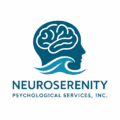Psychological Testing
Evidence-based assessments to understand cognitive, emotional, and behavioral health
Gain Clarity and a Path Forward with Comprehensive Psychological Testing
When you’re facing challenges with memory, focus, mood, or learning, it can be confusing and isolating. Psychological testing at NeuroSerenity provides a clear, scientific understanding of your cognitive and emotional functioning. Our detailed evaluations are more than just a diagnosis; they are a roadmap that identifies your unique strengths and challenges, empowering you and your healthcare team to create a highly effective, personalized treatment plan.
A psychological evaluation is a thorough assessment of how your brain functions. Using scientifically validated tests, our licensed psychologists measure critical areas like:
- Memory & Recall
- Attention & Concentration
- Problem-Solving & Executive Function
- Language & Verbal Skills
- Processing Speed
This process helps us understand the root causes of your symptoms, providing objective data to guide your care.
We provide clarity for individuals experiencing symptoms related to a wide range of conditions, including:
- Neurological Conditions: Traumatic Brain Injury (TBI), Parkinson’s Disease, Epilepsy, and other cognitive disorders.
- Mental Health Conditions: Depression, Anxiety, Bipolar Disorder, and PTSD, especially when cognitive symptoms are present.
- Neurodevelopmental Disorders: Attention-Deficit/Hyperactivity Disorder (ADHD), Autism Spectrum Disorder (ASD), and specific learning disabilities (e.g., dyslexia).
- Monitoring Needs: Tracking progression in neurodegenerative conditions or assessing cognitive changes before and after medical procedures (e.g., neurosurgery, Deep Brain Stimulation).
- Accurate Diagnosis: Differentiate between conditions with overlapping symptoms (e.g., is it ADHD, anxiety, or both?).
- Personalized Treatment Planning: Identify specific cognitive strengths and weaknesses to tailor therapy, rehabilitation, and academic or workplace accommodations.
- Progress Tracking: Establish a baseline to objectively measure the effectiveness of treatment or track changes over time.
- Clarity and Validation: Finally understand the "why" behind your challenges, reducing self-blame and providing a clear direction.
The NeuroSerenity Testing Process
We’ve designed our process to be as comfortable and transparent as possible.

01. Initial Consultation
We discuss your concerns, history, and goals to ensure we tailor the testing battery to your specific needs.
02. The Testing Session
The evaluation itself is typically conducted in a single session lasting 2 to 5 hours. For more complex cases, it may be spread over multiple days to prevent fatigue. You will work one-on-one with a psychologist in a quiet, supportive environment. Breaks are encouraged to ensure you can perform at your best.
03. Analysis & Report Writing
Our psychologists meticulously analyze the results, integrating them with your personal history to form a complete picture.
04. Detailed Feedback Session
This is a crucial step. We schedule a separate appointment to walk you through the findings in plain language, answer all your questions, and discuss the personalized recommendations outlined in your comprehensive report.
Frequently Asked Questions
From the testing session to your feedback appointment, the process typically takes 2-3 weeks. The testing session itself usually lasts 2-5 hours.
Please bring any relevant medical records, a list of current medications, and glasses or hearing aids if you use them. Get a good night's rest and eat a healthy meal beforehand.
Many insurance plans provide coverage when testing is medically necessary. We recommend contacting your insurance provider to verify your benefits. Our team can provide you with the necessary codes and documentation to assist you.
Yes. We adhere to strict HIPAA guidelines. Your report and records are completely confidential and will not be shared with anyone without your written consent.
While a therapy intake focuses on your emotions, history, and current life challenges, psychological testing provides objective, data-driven insights into your cognitive functioning (like memory and attention). The two processes complement each other perfectly.
